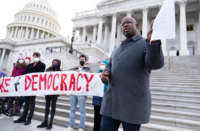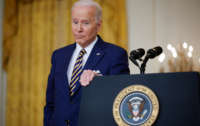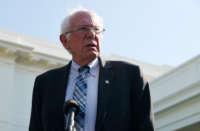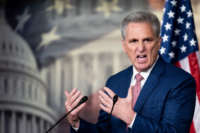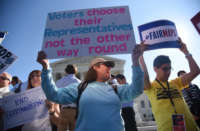
A strike waged by over 8,000 grocery workers in Colorado has ended after the union announced on Friday that it has reached a tentative agreement with King Soopers, which is owned by grocery giant Kroger.
Union members will begin voting on the three-year deal on Monday. The United Food and Commercial Workers (UFCW) Local 7 told workers that they are to return to work within a week.
The terms of the agreement have not yet been made public, but workers will be given details in the coming days. Kim Cordova, the president of UFCW Local 7, praised the deal.
“After months of negotiations and after our members walked out on strike, we have reached a tentative agreement with King Soopers/City Market that addresses the company’s unfair labor practices and ensures that our members will receive the respect, pay and protection they warrant,” Cordova said in a statement.
“This fight will always be about the workers. I could not be prouder of our members who put it all on the line to have their voices heard,” she continued.
The strike was originally slated to last three weeks after the company claimed its offer from early January was its “last, best and final” one.
The company says that the current agreement will improve wages, health care and pension plans for its workers. But the company also claimed that the offer workers rejected last week would have raised wages – even though the union said that the raise would have amounted to mere pennies for some workers.
The union, which was at the negotiating table for months, has previously said that the company wasn’t negotiating in good faith; Cordova said that the company continually made proposals during negotiations that were even worse than the offer that kicked off the strike. Last Friday, Cordova said that workers’ demands were being ignored by the company.
“King Soopers’ latest proposal contains numerous poison pill provisions, one of which would make wage rates proposed by the Company worth less than the paper they are printed on,” Cordova said in a statement on January 14. “Under this proposal, workers could forfeit daily overtime pay and some are looking at wage cuts of up to $3.34 per hour.”
The company has faced increased scrutiny as a result of the strike. In a survey last week of nearly 37,000 Kroger workers – including those in Colorado – researchers found that thousands of the company’s employees don’t make enough money to get by. In a portion of the survey that included workers who were members of UFCW Local 7, 63 percent of respondents said that they don’t earn enough to pay for basic expenses like food and rent.
Seventy-eight percent of workers in the same portion of the survey said that they experienced either low or very low food security. Meanwhile, 14 percent of workers said that they were currently experiencing homelessness or that they had been homeless at one point over the past year.
The company is well aware that its workers have been experiencing financial hardship, More Perfect Union found. In 2018, an internal “State of the Associate” presentation informed Kroger executives that a large swath of the company’s workers were in poverty and relying on food stamps to survive.
At least 1 in 5 associates were on government assistance, the presentation said. It also noted that in Ohio, where Kroger is based, a $15 an hour wage is required to afford to pay rent for a two-bedroom home. “On average, 2.9 full-time jobs paying minimum wage are needed to rent a two-bedroom unit,” the presentation said.
Meanwhile, in 2020, Kroger paid CEO Rodney McMullen $20.6 million in compensation, including an over 45 percent raise in the same year that the company cut employees’ $2 an hour “hero pay” after giving it to them for mere weeks at the beginning of the pandemic.
The company has been condemned by Sen. Bernie Sanders (I-Vermont), who wrote a letter to McMullen on Thursday demanding that the company give workers a fair agreement after presenting an “unacceptable offer” in the latest negotiations.
“Your company is making record breaking profits that are expected to exceed $4 billion last year alone. Kroger has provided over $1.5 billion in stock buybacks and dividends to enrich wealthy shareholders,” Sanders wrote. “This is precisely the type of corporate greed that the American people are sick and tired of.”
This post was originally published on Latest – Truthout.
